- Home
- Shirley Jackson
The Bird's Nest Page 8
The Bird's Nest Read online
Page 8
Now she continued, while I sat aghast, “Elizabeth, Beth, Betsy, and Bess, they all went together to find a bird’s nest . . . Perhaps, you handsome Doctor Wrong, you would care to rename us? We must surely not be the first children you have brought into the world.” And she burst again into her wild laughter, and—although Miss Hartley, my nurse, must surely by now be accustomed to loud noises from my office—I was half-afraid that Miss Hartley might conclude that I was being laughed at by one of my own patients, since the laughter was so clearly not hysterical. Interesting R3, or threatening her, were the only two methods I so far knew to quiet her, so I said in a low voice, “I shall awaken you, Miss R., if you do not tranquillize yourself.”
She was silent at once, but murmured wickedly, “Someday you will not be able to get rid of me, Doctor Wrong; someday you will try to awaken her, and, when you think you have got back your disgusting Miss R., will find that you still have just me. And then,” she said, her voice rising and her hands at her eyes, “and then, and then, and then!”
Fear touched me lightly, but I said, “Why, then if I find I have only you no matter who I seek, I shall have to learn to love you.” I smiled wryly at the thought of loving this monster, and I suppose she detected my expression in my voice, for she said at once, “But do you suppose I could learn to love you, Doctor Wrong? When you wish me evil?”
“I wish no one evil, Miss R.”
“Then you are a liar as well as a fool,” she said. (I note down these remarks in the interests of thoroughness; I know I am not a liar and I hope I am not a fool, and I perceived that R3’s object was to enrage me; I am happy to add that although I was irked at her rudeness, I endeavored, I believe with success, to keep her from realizing it.) “I know a good deal about people,” she continued with complacency, “and when I have my eyes open all the time I will get along nicely. No one will ever suspect how long I have been a prisoner, I think.”
I hardly dared breathe, hearing R3 rattle along so, revealing herself more with every word; this boastful chatter made it unnecessary to question her, and I would not have interrupted her for the world. “Now,” she said, as one explaining an awkward position, “I can only get out when she is looking the other way, and then only for a little while before she comes back and shuts me in again, but someday very soon she is going to find that when she comes back and tries to—” She broke off suddenly, and chuckled. “Eavesdropping, Doctor Wrong?” she asked, “do you add poking and prying to your list of sins?”
“I am trying to help my friends, Miss R.”
“Please stop calling me that,” she said petulantly. “I tell you, I am not Miss R., and I hate her name; she is a crybaby and a foolish stupid thing, and I certainly am not.”
“What shall I call you, then?”
“What do you call me in those notes? The ones you showed her once?”
I was astounded at her knowing of my notes, and that Miss R. had once seen them, but I only said, “I have no name for you, since you disclaim your natural one. I have called you R3.”
She made a face at me, putting out her tongue and shrugging her shoulders. “I certainly don’t choose to be called R3,” she said. “You can call me Rosalita, or Charmian, or Lilith, if you like.”
I smiled again at the thought of this grotesque creature naming herself like a princess in a fairy romance. “Do you also disclaim the name Elizabeth?” I inquired.
“That’s her name.”
“But,” I cried, struck with an idea, “you yourself have suggested it: ‘Elizabeth, Beth, Betsy, and Bess . . .’”
She laughed rudely. “Elizabeth is the simple, Beth is the doctor’s darling; very well, then I choose Betsy.” And she laughed again.
“Why do you laugh?”
“I was wondering about Bess,” she said, laughing.
And so, my dear reader, was I.
• • •
So Betsy she was till the end of her chapter. I found that as these several different girls grew more familiar to me, and of course in the second case more dear, the names Betsy had chosen for them became easier and pleasanter to use than the cold clinical R1 and R2; R2 consented graciously and with a smile to my plea to be allowed to address her as Beth, and I think the name suited her quiet charm. I do not know if Miss R. ever perceived that I had moved quietly away from addressing her formally, or at least from calling her “my dear Miss R.” to calling her Elizabeth; I suppose that she was too accustomed to constant authority in the shape of her aunt to remark being addressed as a child. Betsy, of course, was Betsy and nothing else, although she sometimes amused herself by giving herself grandiose titles or surnames, and I had no difficulty, subsequently, in identifying a note signed Elizabeth Rex as of Betsy’s doing.
• • •
My immediate attempt must be, I thought, to discover the point at which the unfortunate Miss R. had subdivided, as it were, and permitted a creature like Betsy to assume a separate identity; it was my old teasing analogy of the sewer, but complicated in that I was now searching for a branch line! (I do most heartily wish that I had chosen some comparison nearer the stars; a flourishing oak tree, perhaps, but I confess that I misguidedly chose that which seemed most vivid to me, and most indicative, although ignoble, of the circumstances; I am ashamed to think that without going through and correcting all of my manuscript, and my notes, too—for this comparison found a place even there—I must abide by it.) It seemed to me that only a very severe emotional shock could have forced Miss R. to slough off the greater part of herself into subordinate personalities (until I had, with a magic touch, called them into active life) and I was fairly certain that their separate existence—although Betsy claimed a life of her own, in thoughts at any rate, ever since Miss R. had been born—must date from the most patent emotional shock in Miss R.’s life, the death of her mother. To show what kind of a problem I was manipulating, let me from my notes present the reader with the varying descriptions of this event which I received, first from R1, or Elizabeth, then from R2, the cooperative and lovely Beth, and then, lastly, from our villain Betsy.
(On May 12, to Elizabeth, in office consultation): Wright: Do you think you can tell me anything about your mother, my dear?
Elizabeth: I guess so.
W. When did she die?
E. I guess over four years ago. On a Wednesday.
W. Were you at home?
E. (confused) I was upstairs.
W. Did you live then with your aunt?
E. With Aunt Morgen?
W. Do you have any other aunts?
E. No.
W. Then, when your mother died, were you living with your aunt?
E. Yes, with Aunt Morgen.
W. Do you think you can tell me anything more about your mother’s death? (She seemed most unwilling, and I thought on the edge of weeping; since I knew I could secure all the information I needed from the other selves, I did not intend to persist in a cruel cross-examination, but I did want as much information as possible for purposes of comparison.)
E. That’s all I know. I mean, Aunt Morgen came and told me my mother died.
W. Came and told you? You mean, you were not with your mother when she died?
E. No, I was upstairs.
W. Not with your mother?
E. Upstairs.
W. Was your mother downstairs, then?
E. Aunt Morgen was with her. I don’t know.
W. Try to stay calm, if you please. This was all very long ago, and I think talking about it will be helpful to you: I know it is a painful subject, but try to believe that I would not ask you unless I felt it to be necessary.
E. No. I mean, I only don’t know.
W. Had your mother been ill?
E. I thought she was all right.
W. Then her death was quite sudden, to your mind?
E. It was—(thinking deeply)—a heart
attack.
W. But you were not there?
E. I was upstairs.
W. You did not see her?
E. No, I was upstairs.
W. What were you doing?
E. I don’t remember. Asleep, I guess. Reading.
W. Were you in your own room?
E. I don’t remember. I was upstairs.
W. I beg you to compose yourself, Miss R. This agitation is unnecessary and unbecoming.
E. I have a headache (touching her neck).
And that was, of course, the end of my information from Elizabeth; I knew by now that her headaches, all-enveloping, would obliterate almost all awareness of myself and my questions. So I pursued my line of questioning, most pleasantly, by summoning Beth. I longed, at this time, to chat with Beth informally, and at length, and I longed to permit her to open her eyes, so that we might seem friends rather than doctor and patient, but the ever-present fear of Betsy prevented; since blindness was now the only thing I knew of which held Betsy in check, I dared not follow my inclinations and admit Beth as a free personality. I was sad, frequently, to think that Beth’s whole existence had heretofore been passed only in my office, and that none but I knew this amiable girl; my conviction that Miss R. must once have been very like Beth was so far unconfirmed, and yet I deeply wanted to see Beth take her place in the world and in her family, the place to which my most unscientific heart told me she was entitled. At any rate, it was always a great pleasure to me to call Beth, and hear her affectionate greeting. Here are my notes on this conversation, which followed immediately upon the conversation with Elizabeth which I have just described.
(On May 12, Beth, or R2, in office consultation): Wright (after preliminary trance-inducing introduction of name and place identification) My dear, I want to talk about your mother.
B. (smiling wistfully) She was a lovely lady.
W. Much like yourself?
B. Yes. Very lovely and very happy and very sweet to everyone.
W. Do you remember her death?
B. (reluctantly) Not very well. She died that day.
W. Where were you when she died?
B. I was thinking of her.
W. But where?
B. Inside. Hidden.
W. As you usually are?
B. Except when I am with you.
W. I hope we can change that someday, my dear. But you must help me.
B. I will do anything you ask me to.
W. Splendid. I am most anxious, right now, to learn all I can about your mother’s death.
B. She was very kind to everyone, even Aunt Morgen.
W. You lived with your aunt at the time?
B. Oh, yes, we have lived with her for years, ever since my dear father died.
W. And your father died when?
B. When I was two years old, or about that. I don’t remember him very well.
W. Were you with your mother when she died?
B. I? I was never allowed to be with her. I am always kept hidden.
W. Compose yourself, Beth dear. We can talk of something else if this disturbs you.
B. No, I am eager to help in any way I can; I don’t want you to think badly of me.
W. I assure you, I never shall. Can you tell me, then, precisely what you did after your mother’s death?
B. (perplexed) We had lunch. And Aunt Morgen said not to worry.
W. Not to worry? You mean, not to grieve?
B. Not to worry. We had lunch and Aunt Morgen said not to worry, Aunt Morgen said not to cry over spilled milk, Aunt Morgen cried. It was disgusting.
W. (amused) You will not allow your aunt her grief?
B. She cried over spilled milk.
W. (laughing outright) Beth, this is cynicism.
B. Indeed not; I do not think evil of anyone.
A man who has just spoken, however inconclusively, with Beth, does not turn hastily to a conversation with Betsy. Nevertheless, it was obvious that the information which Elizabeth and Beth found themselves unable to give must be mined from Betsy, and so, resolutely, I denied the appeal of Beth’s pretty face and dismissed her for Betsy; I made an effort to keep my countenance when Beth’s turned head disclosed that grinning face, even though she could not, of course, see me, and I forced my voice to remain even and controlled.
(May 12, Betsy, or R3, in office consultation): W. Good afternoon, Betsy. I hope I find you in excellent health.
By. (jeering) The others won’t help, so you come and ask me.
W. I hoped you might tell me—
By. I know. I was listening. (contemptuously) What do you think they can tell you?
W. —about your mother.
By. My mother? Do you think I claim that poor dead thing as my mother? Perhaps (impudently) I have a mother of my own, question-asker.
W. (Indeed if you had, you demon, I thought, she’s a fiend in damnation): Miss R.’s mother, then.
By. As you are her father? (raucous laughter)
W. Miss R.’s mother, who died some years ago. Elizabeth’s mother.
By. I know whose mother you mean, old man. The one she—(here she shut her lips, and grinned mysteriously, and put her finger to her mouth in a childlike gesture of secrecy)—Talking about Lizzie when her back is turned, my dear! For shame!
W. Betsy, I would like you to trust me. Believe me, I am only a person who wants to do whatever I can to ensure that you and Elizabeth and Beth will live together peaceably and happily; would you not like to be one person again?
By. I was never one person with her, I have always been her prisoner, and you wouldn’t help me if you could. You may want to help Beth, and maybe even Lizzie, but you have no place for me in your pretty little world.
W. Indeed, I am truly sorry to see anyone so bitter as to refuse help when it is so badly needed.
By. I have told you hundreds of times that the best way to help me is to let me open my eyes. (gestures of wringing hands, and bringing them up to her eyes.)—May I?—(wheedlingly)—May I open them, dear Doctor Wright? And I will tell you everything you want to know, about Lizzie and about Lizzie’s mother and about old Auntie and I will even put in a good word for you with Beth if I may only have my eyes open— (This was said in a tone of such mockery that I was gravely concerned; I had suddenly the notion that Betsy was teasing me, and might perhaps open her eyes this minute if she chose, and I was genuinely frightened at the thought.)
W. I insist that you keep your eyes closed. Do you realize, young lady, that if I find that you are of no use to me in my investigations, I will surely send you away and never let you come again? (I would have liked to, certainly, and perhaps even then I still could have.)
By. (apprehensive) You will not send me away.
W. I may; it was I who brought you here in the first place.
By. I can come by myself.
W. (not choosing to press this point) We shall see. (carelessly) Perhaps you are fond of sweets? (I had thought of this earlier; it occurred to me that a creature so childish might be fairly treated on childish terms; I had as alternatives a doll, and some tawdry jewelry.) Shall I put a candy in your hand?
By. (eagerly) Do you have candy right here?
W. (placing in her outstretched hand a piece of candy which she consumed greedily.) I am glad you begin to find me more friendly. No one would give you candy who did not wish you well.
By. (with satisfaction) If you poisoned me, then Lizzie and Beth would die.
W. I have no intention of poisoning you. I should like to have us friends, you and I.
By. I will be friends with you, old well-wisher. But I want more candy, and I want to open my eyes.
W. I assure you, you will never open your eyes with my permission. But can we not talk together as friends, Betsy?
By. (craftily) You have not given
me any more candy yet.
W. (craftier still) When you tell me about your mother.
By. (unexpectedly gentle) Elizabeth’s mother? She was always nice. She danced around the kitchen one day when she had a new dress and she said “Nonsense” to Morgen and she curled her hair. I liked to watch her.
W. Where were you?
By. A prisoner, always a prisoner, inside with Beth, only no one knew I was there.
W. Were you ever free? Outside, I mean?
By. (nodding, dreamy) Sometimes, when Lizzie is sleeping or when she turns her head away for a minute, I can get out, but only for a small time, and then she puts me back. (recollecting herself suddenly) But I am not going to tell you, you are not friendly to me.
W. Ridiculous; you know now that we are friends. Were you inside when Elizabeth’s mother died?
By. Surely, and I made her scream even louder, and beat on the door.
W. Why did she beat on the door?
By. Why, to get out, Doctor Wrong.
W. To get out of what?
By. To get out of her room, Doctor Wrong.
W. What in heaven’s name was Elizabeth doing shut in her room while her mother was dying?
By. Now, see, Doctor Wrong, I did not say that her mother was dying, although she surely was, and yet it was not in heaven’s name—(laughs wildly)—and as for what Lizzie was doing in her room, why, she was beating on the door.
W. Will you explain it to me?
By. Now certainly not, Doctor Wrong; we all went together to seek a bird’s nest; do you remember the man who was wondrous wise and jumped into a bramble bush and scratched out both his eyes . . . may I open my eyes now?
W. No.
By. —put her in a pumpkin shell, and there she kept her very well. And so Lizzie’s mother died, and it was a good thing, too. She wouldn’t have cared for our Lizzie now.
W. Did Elizabeth change after her mother died?
By. (tormenting) I only said that to tease you, eye-closer. I can tell you wonderful stories about your dear. Ask Lizzie about the box of letters in her closet. Ask Beth about Aunt Morgen. (laughing wildly again) Ask Aunt Morgen about Lizzie’s mother.

 The Road Through the Wall
The Road Through the Wall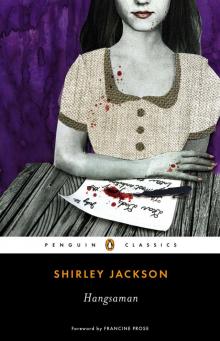 Hangsaman
Hangsaman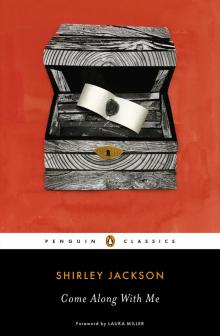 Come Along With Me
Come Along With Me The Lottery
The Lottery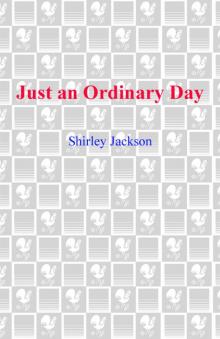 Just an Ordinary Day: Stories
Just an Ordinary Day: Stories The Sundial
The Sundial Dark Tales
Dark Tales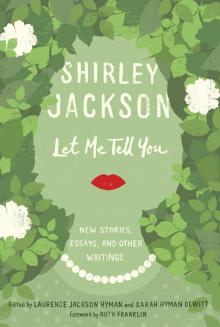 Let Me Tell You: New Stories, Essays, and Other Writings
Let Me Tell You: New Stories, Essays, and Other Writings The Haunting of Hill House
The Haunting of Hill House The Bird's Nest
The Bird's Nest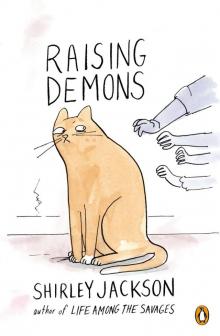 Raising Demons
Raising Demons We Have Always Lived in the Castle
We Have Always Lived in the Castle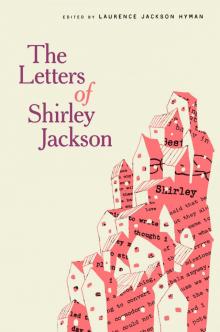 The Letters of Shirley Jackson
The Letters of Shirley Jackson The Missing Girl
The Missing Girl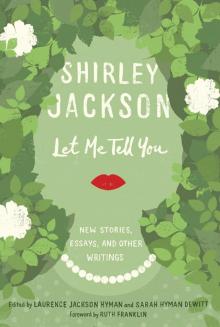 Let Me Tell You
Let Me Tell You